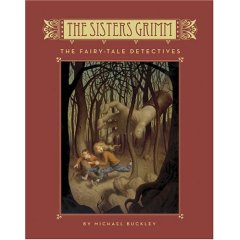
Star Rating: 2.5 out of 4
Man. That was a hard star rating to decide. This book fell squarely into the debate I regularly hold with myself between judging something because I Don't Like It and because It's Poorly Done. After consideration, I've concluded it's not poorly done - in fact, I think it's done rather well for the most part. The problem for me is, all of the book's central characters are teenagers coming up on their high school graduation, and I find high schoolers teeth-gratingly annoying. (Perhaps this is why I haven't read much YA up until now.) So I'm giving the book my highest possible starring without implying I like it.
The central character, Quentin Jacobson, has had a crush on his neighbor Margo since they were nine years old and discovered a dead body together. She's popular at school and he's not, so they haven't communicated much for years (eye roll - if you want to talk to someone, just talk to them!), but one night she shows up at his window and convinces him to drive her around to various schoolmates' houses helping her take her revenge on them. Soon afterwards she disappears, which she's done often before. (Margo, we are to understand, is a Free Spirit.) Usually Margo leaves clues on where she can be found, so besotted Quentin sets out to try to find her this time.
Green does a great job recreating the mentality of an 18-year-old boy. (Sample dialogue: "I decided during government that I would actually, literally suck donkey balls if it meant I could skip that class for the rest of the semester.") The writing is straightforward to the point of being simplistic, often funny depending on one's sense of humor, and almost unremittingly centered around testicles. It's a quick read because of that, which isn't a bad thing - again, depending on one's perspective.
Quentin is quite likable as a character, as is his friend Radar (so nicknamed for the M*A*S*H character, only he's black and wears contacts now), but unfortunately I couldn't dredge up much sympathy for Margo. Margo pulls pranks, sets out for petty revenge, and screws with people's heads on a regular basis with impunity. The entire book is basically Margo screwing with everyone, and the ending does very little to relieve her of responsibility for that. In fact, though I hate to say it, I found the ending sadly preachy for a book so real and down-to-earth the rest of the time.
Over the course of his investigation, Quentin uses Margo's marked copy of Whitman's "Leaves of Grass" to try to discover facts about her, and in so doing he gradually teaches himself empathy, the art of putting oneself in someone else's place to see from their perspective. It's a lovely use of Whitman, though maybe laid on a little thick for the benefit of a teenaged audience. The mystery part of the story is just well-developed enough to keep Quentin running around in circles and almost unhealthily obsessed. The book contains plenty about video games, school bullies, teenaged parties, and THE PROM, but it's so much more when it's about Quentin's self-journey that at times Margo almost becomes a MacGuffin - an element that drives the plot but isn't important on its own merit.
Is this an accurate portrait of high school teenagerhood? Honestly, I have no idea, because my teenage years weren't anything like this. I was homeschooled - actually went to an online school for high school. We didn't talk like this. We didn't think like this. We didn't behave like this. Online schools have no pecking order - there was no popular clique, no band kids, no bullying, no social stratification of any kind. As I recall, many of my conversations revolved around the Nature of the Universe. We were heady teens, like mini-adults with a few extra hormones. So I think I just Do Not Get the "typical" high school experience, and unlike many other things I read about that I similarly haven't experienced, I'm not able to empathize with it. I'll have to ponder why that is. My gut reaction is to say it's because teenagers are annoying and high school popularity contests are interesting to no one but the participants, but I'm sure there's more to it than that. ;-)







